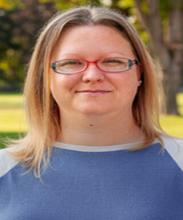
Ashley Groshong, Ph.D.
National Institute of Allergy and Infectious Diseases (NIAID)
Dr. Ashley Groshong was born and raised in Little Rock, Arkansas and received a B.S. in Biology and a B.A. in Chemistry and English at the University of Arkansas at Little Rock. She began studying Borrelia burgdorferi and its virulence determinants during her Ph.D. in Microbiology and Immunology at the University of Arkansas for Medical Sciences. She completed a postdoctoral fellowship at the University of Connecticut Health Center where she studied B. burgdorferi gene regulation throughout the enzootic cycle. Upon promotion to Instructor of Basic Science, she began developing her studies on bacterial physiology by focusing on amino acid acquisition by the spirochete. As a tenure-track investigator in the Laboratory of Bacteriology at Rocky Mountain Laboratories (part of NIAID) in Hamilton, Montana, her lab focuses on mechanisms of nutritional acquisition and metabolism that are essential for B. burgdorferi to maintain its enzootic cycle.
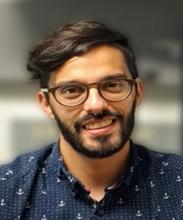
Carlos Guardia, Ph.D.
National Institute of Environmental Health Sciences (NIEHS)
Dr. Carlos (Charly) Guardia was born and raised in Buenos Aires, Argentina. He received his bachelor and master’s degrees in Chemistry, and his Ph.D. in Structural Biology from the University of Buenos Aires. After a postdoctoral fellowship at NICHD, he joined the Reproductive and Developmental Biology Laboratory at NIEHS as an Earl Stadtman tenure-track investigator to establish the Placental Cell Biology Group. The goal of his research is to elucidate the molecular mechanisms that control autophagy response during placental development in homeostasis and disease. His research plan is focused on generating a comprehensive understanding of placental-specific autophagy processes and the connection with the secretory pathway during placental development and function. The aim is to understand pregnancy outcomes for women living in communities where environmental health disparities are persistent, by focusing on the development of the first organ of the baby: the fascinating placenta.
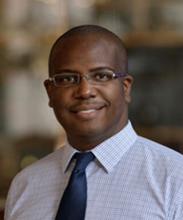
Neil Hanchard, M.B.B.S., D.Phil.
National Human Genome Research Institute (NHGRI)
Dr. Neil Hanchard was born and raised in Kingston, Jamaica. He received his M.B.B.S. (Hons) from the University of the West Indies in Kingston, Jamaica, before obtaining a D.Phil. in Clinical Medicine (Human Genetics) from the University of Oxford where he was a Rhodes Scholar. He is Board Certified in Pediatrics and Medical Genetics, having completed Pediatric residency training at the Mayo Clinic and Medical Genetics training at Baylor College of Medicine (BCM). He was a tenured physician-scientist faculty member at BCM prior to joining the NIH, where he is now a Stadtman Investigator in the Center for Precision Health Research within NHGRI. His lab focuses on integrating quantitative human and population genetics with multi-omic assessments to better understand complex pediatric diseases in diverse population groups. His current portfolio of research includes sickle cell disease, severe childhood malnutrition, early-onset hypertension, and pediatric HIV infection.
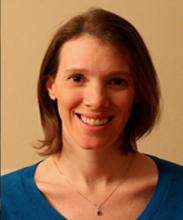
Christine Heske, M.D.
National Cancer Institute, Center for Cancer Research (NCI CCR)
Dr. Christine Heske was born and raised on Long Island, New York. She obtained her bachelor's degree in Biological Anthropology from Harvard College and her medical degree at the George Washington University School of Medicine and Health Sciences. She is a board-certified physician in pediatrics and pediatric hematology/oncology, having completed her internship and residency in pediatrics at Brown University Hasbro Children's Hospital and her fellowship in pediatric hematology/oncology at the Johns Hopkins University/National Cancer Institute combined program. She initially joined the Pediatric Oncology Branch at NCI as a research fellow and was subsequently selected to be a CCR Physician-Scientist Early Investigator. She is currently a tenure-track investigator at NCI in the Pediatric Oncology Branch. Her long-term goal as a physician scientist is to improve outcomes for children and young adults with sarcoma through identification and evaluation of new therapeutic targets.

Suchitra Hourigan, M.D.
National Institute of Allergy and Infectious Diseases (NIAID)
Dr. Suchitra (Suchi) Hourigan was born in the United Kingdom and received her medical degree from the University of Oxford. She completed her pediatric residency and pediatric gastroenterology fellowship at the Johns Hopkins Hospital. Prior to joining NIAID, she held faculty positions at the Johns Hopkins School of Medicine and at the University of Virginia, and served as Vice Chair of Research, Inova Children’s Hospital. She is now a Lasker Clinical Research Scholar and tenure-track investigator who as Chief of the Clinical Microbiome Unit leads a clinical research program focused on microbiome interventions to mitigate chronic inflammatory diseases. Her studies include a clinical trial of the microbiome intervention, “vaginal seeding,” in babies born by Cesarean section, who are at increased risk of inflammatory diseases, as well as investigations of other microbiome interventions including fecal transplant and early life antibiotics. Her research program takes a novel, integrative approach combining advanced exploration of microbiome and host physiology interactions with objective assessments of health consequences of clinical microbiome interventions.

Silvia Lopez-Guzman, M.D., Ph.D.
National Institute of Mental Health (NIMH)
Dr. Silvia Lopez-Guzman was born and grew up in Bogotá Colombia, where she received her M.D. from Pontificia Universidad Javeriana. After postdoctoral research at Harvard Medical School and Brigham and Women’s Hospital where she worked on immunology of lung injury, she switched fields and, with support from a Fulbright Commission award, she received her Ph.D. in Neuroscience from New York University. Her doctoral work was on developing and validating computational markers of clinical outcomes in patients under treatment for opioid use disorder. She was a faculty member at the School of Medicine and Health Sciences at Universidad del Rosario in Bogotá, before joining NIMH in 2021 as a tenure-track investigator and Chief of the Computational Decision Neuroscience Unit. This new unit will focus on the study of the computational and neurobiological bases of decision-making and how this process is at the center of depression, addiction, and chronic pain. This goal is to apply insights from computational psychiatry to develop clinical tools for the prevention and treatment of these disorders.

Troy McEachron, Ph.D.
National Cancer Institute, Center for Cancer Research (NCI CCR)
Dr. Troy McEachron was born in Brooklyn, NY and subsequently moved to Valley Stream, NY. He received his bachelor’s degree in Microbiology from Arizona State University and his Ph.D. in Molecular and Cellular Pathology from the University of North Carolina at Chapel Hill where he studied cancer associated thrombosis. Dr. McEachron pursued postdoctoral training at St. Jude Children’s Research Hospital and additional training in pediatric cancer genomics at the Translational Genomics Research Institute. He became an Assistant Professor in the Departments of Translational Genomics and of Pediatrics at the Keck School of Medicine of the University of Southern California. Dr. McEachron joined the NCI in 2021 as a tenure-track investigator in the Pediatric Oncology Branch where he currently leads the Integrated Solid Tumor Biology Section. His research objective is to thoroughly investigate pediatric sarcomas and reveal the dynamic relationships between tumor cells and their tissue-specific microenvironments to identify and functionally validate actionable molecular and/or cellular targets for clinical translation.
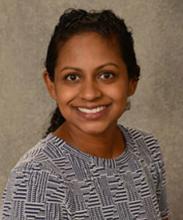
Anandani Nellan, M.D.
National Cancer Institute, Center for Cancer Research (NCI CCR)
Dr. Anandani Nellan grew up in Malaysia and moved to the United States during middle school. She studied Spanish and Biology as an undergraduate before completing a joint MD-MPH graduate program at the University of Arizona. She is a pediatric neuro-oncologist who trained in the joint NIH-Johns Hopkins Pediatric Hematology-Oncology program and then moved to the Children’s Hospital of Colorado for a pediatric neuro-oncology fellowship. Dr. Nellan became interested in pediatric neuro-oncology while taking care of patients with brain tumors during her residency. She was struck by both the intensity of therapy and the high risk of relapse that patients face. Her primary goal is to pioneer new immunotherapies for pediatric brain tumors, with a focus on preclinical, translational studies in the lab. Her research focuses on studying the interplay between the tumor and immune microenvironment to understand mechanisms of treatment resistance and to develop effective immunotherapeutic strategies.
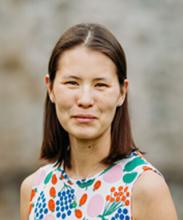
Sarah Sheppard, M.D., Ph.D.
National Institute of Child Health and Human Development (NICHD)
Dr. Sarah Sheppard grew up in Bedford, Massachusetts. She received her bachelor’s degree from the Massachusetts Institute of Technology in Nuclear Science and Engineering, followed by her M.D. and Ph.D. at the University of Massachusetts Medical School. She completed a combined residency in Pediatrics and Medical Genetics at the Children’s Hospital of Philadelphia. She completed a post-doctoral fellowship, a Master of Science in translational research, and an instructorship at the Children’s Hospital of Philadelphia and the Perelman School of Medicine at the University of Pennsylvania. As a tenure-track investigator at NICHD, she will lead a laboratory focused on understanding the cellular and molecular mechanisms that cause complex lymphatic anomalies, and on developing personalized therapies to treat patients with complex lymphatic anomalies.
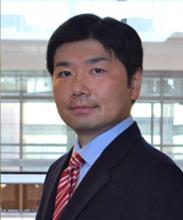
Kosuke Tamura, Ph.D.
National Institute on Minority Health and Health Disparities (NIMHD)
Dr. Kosuke Tamura was born and grew up in Tokyo, Japan. He earned his bachelor’s degree in Political Science from Komazawa University, Tokyo, and a master’s degree in International Affairs from Ohio University. He earned a master’s degree in Agricultural Economics and a doctoral degree in Health and Kinesiology from Purdue University. He completed postdoctoral fellowships in the Department of Population Health at NYU Grossman School of Medicine, and at the National Heart, Lung, and Blood Institute. He is now an Earl Stadtman tenure-track investigator and runs the Laboratory of Neighborhood Social and Geospatial Determinants of Health Disparities at NIMHD. As a spatial and social epidemiologist, his main research focuses on investigating from a geospatial perspective the impact of neighborhoods (measured via geographic information systems and global positioning systems) on health behaviors (physical activity, diet, sleep) and cardiovascular disease risks (diabetes, obesity) among children, adults, and older adults as well as minority individuals.
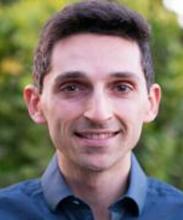
Mark Wagner, Ph.D.
National Institute of Neurological Disorders and Stroke (NINDS)
Dr. Mark Wagner grew up in Long Island, New York. He obtained a B.A. and M.S. in Bioengineering from Harvard University, followed by a Neuroscience Ph.D. as well as postdoctoral research at Stanford University. He is a Stadtman tenure-track investigator heading the Neocortex-Cerebellum Circuitry lab in NINDS. Dr. Wagner's group studies the interactions among brain regions in learning and behaving animals, using in vivo brain microscopy and optogenetics, viral-genetic neuroanatomical techniques, and computational modeling. The lab's broad goals are to decipher the fundamental algorithms that underlie the brain's capacity for general learning, which will shed light on how these processes are disrupted in neurological disorders.

Keenan Walker, Ph.D.
National Institute on Aging (NIA)
Dr. Keenan Walker was born and raised in Southern California. He obtained his undergraduate degree in Psychological and Brain Sciences from Johns Hopkins University, and his Ph.D. in Clinical Psychology from St. John's University. He completed his pre-doctoral internship in clinical neuropsychology at the University of California San Diego / VA San Diego Healthcare System before beginning an NIH-funded postdoctoral fellowship at Johns Hopkins University School of Medicine in age-related cognitive disorders. He began as an Assistant Professor of Neurology at Johns Hopkins School of Medicine in 2019 and soon after received funding for an NIH K23 Career Development Award to study the role of inflammation and immune dysfunction in Alzheimer’s disease. In 2020 he was appointed as a tenure-track investigator in the Intramural Research Program of NIA. Currently, Dr. Walker is the chief of NIA’s Multimodal Imaging of Neurodegenerative Disease (MIND) unit. His lab focuses on understanding the role of abnormal immune and vascular function in Alzheimer’s disease using proteomics, genetics, and multimodal neuroimaging methods.

